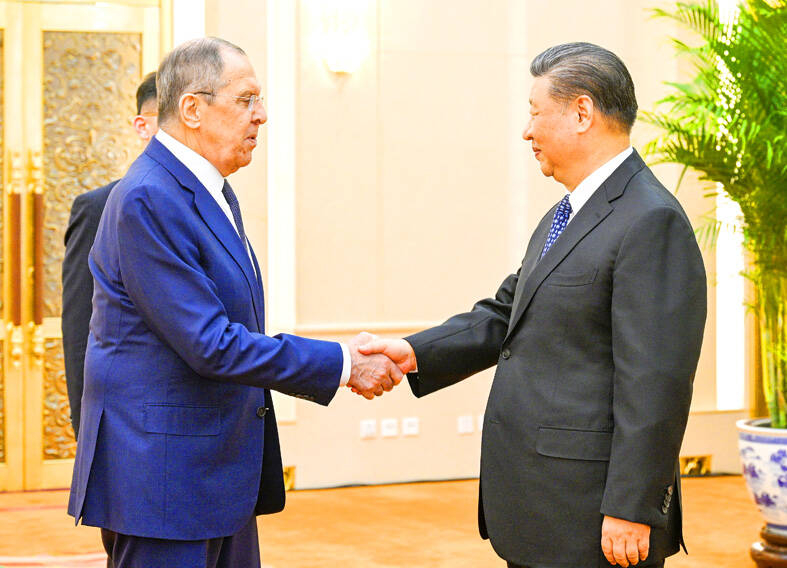China is backing Russia’s war effort in Ukraine by helping Moscow in its biggest military buildup since the Soviet era, providing drone and missile technology, satellite imagery and machine tools, senior US officials said on Friday.
However, the Chinese embassy in the US said it has not provided weaponry to any party, adding that it is “not a producer of or party involved in the Ukraine crisis.”
The officials, speaking on condition of anonymity, said US President Joe Biden raised the issue with Chinese President Xi Jinping (習近平) in their recent phone call and that it is a topic of discussion with US allies in Europe and around the world.

Photo: Xinhua news agency via AP
Chinese materials are filing critical gaps in Russia’s defense production cycle and helping Moscow undertake its “most ambitious defense expansion since the Soviet era and on a faster time line than we believed possible early on in this conflict,” one official said.
“Our view is that one of the most game-changing moves available to us at this time to support Ukraine is to persuade the PRC [People’s Republic of China] to stop helping Russia reconstitute its military industrial base. Russia would struggle to sustain its war effort without PRC input,” the official said.
Chinese embassy spokesman Liu Pengyu (劉鵬宇) said that normal trade between China and Russia should not be interfered or restricted.
“We urge the US side to refrain from disparaging and scapegoating the normal relationship between China and Russia,” Liu said.
Some of the information provided by the US officials in a small briefing with reporters was based on declassified intelligence. They sketched a wide array of ways China is helping Russia’s two-year war against Ukraine without providing lethal assistance.
Russians have likely used machine tool imports from China to increase their ballistic missile production, the officials said.
Last year, 90 percent of Russia’s microelectronics imports came from China, which Russia has used to produce missiles, tanks and aircraft, the officials said.
They said that Chinese companies such as Wuhan Global Sensor Technology Co (武漢高芯科技), Wuhan Tongsheng Technology Co Ltd (武漢同昇科技) and Hikvision Digital Technology Co (海康威視) are providing Chinese optical components for use in Russian systems, including tanks and armored vehicles.
In addition, Russia has received military optics for tanks and armored vehicles that Chinese firms iRay Technology (奕瑞科技) and North China Research Institute of Electro-Optics (華北光電技術研究所) manufacture, they said.
China has provided Russia with drone engines and turbojet engines for cruise missiles, the officials said, adding that Chinese and Russian entities have been working to jointly produce drones inside Russia.
Chinese companies are likely providing Russia with nitrocellulose to make propellants for weapons, helping Russia rapidly expand its capacity to make key munitions such as artillery rounds, they said.
China is helping Russia improve its satellite and other space-based capabilities for use in Ukraine, increasing the Russian threat across Europe, and the US has information that China is providing imagery to Russia for its war on Ukraine, they said.

The CIA has a message for Chinese government officials worried about their place in Chinese President Xi Jinping’s (習近平) government: Come work with us. The agency released two Mandarin-language videos on social media on Thursday inviting disgruntled officials to contact the CIA. The recruitment videos posted on YouTube and X racked up more than 5 million views combined in their first day. The outreach comes as CIA Director John Ratcliffe has vowed to boost the agency’s use of intelligence from human sources and its focus on China, which has recently targeted US officials with its own espionage operations. The videos are “aimed at

STEADFAST FRIEND: The bills encourage increased Taiwan-US engagement and address China’s distortion of UN Resolution 2758 to isolate Taiwan internationally The Presidential Office yesterday thanked the US House of Representatives for unanimously passing two Taiwan-related bills highlighting its solid support for Taiwan’s democracy and global participation, and for deepening bilateral relations. One of the bills, the Taiwan Assurance Implementation Act, requires the US Department of State to periodically review its guidelines for engagement with Taiwan, and report to the US Congress on the guidelines and plans to lift self-imposed limitations on US-Taiwan engagement. The other bill is the Taiwan International Solidarity Act, which clarifies that UN Resolution 2758 does not address the issue of the representation of Taiwan or its people in

US Indo-Pacific Commander Admiral Samuel Paparo on Friday expressed concern over the rate at which China is diversifying its military exercises, the Financial Times (FT) reported on Saturday. “The rates of change on the depth and breadth of their exercises is the one non-linear effect that I’ve seen in the last year that wakes me up at night or keeps me up at night,” Paparo was quoted by FT as saying while attending the annual Sedona Forum at the McCain Institute in Arizona. Paparo also expressed concern over the speed with which China was expanding its military. While the US

SHIFT: Taiwan’s better-than-expected first-quarter GDP and signs of weakness in the US have driven global capital back to emerging markets, the central bank head said The central bank yesterday blamed market speculation for the steep rise in the local currency, and urged exporters and financial institutions to stay calm and stop panic sell-offs to avoid hurting their own profitability. The nation’s top monetary policymaker said that it would step in, if necessary, to maintain order and stability in the foreign exchange market. The remarks came as the NT dollar yesterday closed up NT$0.919 to NT$30.145 against the US dollar in Taipei trading, after rising as high as NT$29.59 in intraday trading. The local currency has surged 5.85 percent against the greenback over the past two sessions, central